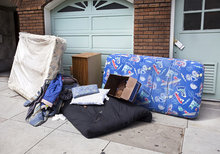0
News Article
Community:
Apr 10, 2019
Senate Democrats, led by Sherrod Brown (OH), Michael Bennet (CO), Dick Durbin (IL), and Ron Wyden (OR), has introduced a new bill that would establish a child allowance for the first time in American history and substantially increase the size of the Earned Income Tax Credit for low-income people.
Authored by: Dylan Matthews for Vox
Topics: Early childhood, Legislation & Policy, Low-income, Research
 Shared by Housing Is
Shared by Housing Is
Housing Is posted a
on Apr 10, 2019
Senate Democrats, led by Sherrod Brown (OH), Michael Bennet (CO), Dick Durbin (IL), and Ron Wyden (OR), has introduced a new bill that would establish a child allowance for the first time in American history and substantially increase the size of the Earned Income Tax Credit for low-income people.
0
Report
Community:
Apr 8, 2019
While the program has changed very little since its inception, the need for the program has increased. In 1975, the number of program grantees stood at 594. Today, the number of grantees stands at 1,268 as more communities qualify to receive direct program allocations. Based on a CDBG Needs Survey conducted by the CDBG Coalition (and discussed later in this report), CDBG grantees have delayed and canceled projects and reduced or permanently eliminated programs because of a lack of CDBG funds. CDBG is an important investment tool for communities and neighborhoods, but program funding must increase to meet local need to ensure CDBG grantee communities are healthy, vibrant and thriving.
Authored by:
Topics: Community development, Funding, Health, Homelessness, Housing, Legislation & Policy, Low-income, Partnerships, Research, Safety, Seniors
 Shared by Housing Is
Shared by Housing Is
Housing Is posted a
on Apr 8, 2019
A report of the CDBG Coalition
While the program has changed very little since its inception, the need for the program has increased. In 1975, the number of program grantees stood at 594. Today, the number of grantees stands at 1,268 as more communities qualify to receive direct program allocations.
0
News Article
Community:
Mar 22, 2019
Hundreds of thousands of people 60 years or older in Ohio are struggling to eat simply because they aren't signing up for the Supplemental Nutrition Assistance Program, or SNAP.
Authored by: Kevin Barry for News 5 Cleveland
Topics: Food insecurity, Low-income, Nutrition, Seniors
 Shared by Housing Is
Shared by Housing Is
Housing Is posted a
on Apr 8, 2019
Kevin Barry for News 5 Cleveland
Hundreds of thousands of people 60 years or older in Ohio are struggling to eat simply because they aren't signing up for the Supplemental Nutrition Assistance Program, or SNAP.
0
News Article
Community:
Apr 3, 2019
The Department of Housing and Urban Development issued a proposed rule Wednesday to improve its Section 3 Program, which requires funding recipients to employ low-income people and business.
Authored by: Jessica Guerin for Housing Wire
Topics: Asset building, Housing, Legislation & Policy, Low-income, Metrics, Place-based, Workforce development
 Shared by Housing Is
Shared by Housing Is
Housing Is posted a
on Apr 8, 2019
Jessica Guerin for Housing Wire
The Department of Housing and Urban Development issued a proposed rule Wednesday to improve its Section 3 Program, which requires funding recipients to employ low-income people and business.
0
News Article
Community:
A living wage is an antidepressant. It is a sleep aid. A diet. A stress reliever. It is a contraceptive, preventing teenage pregnancy It prevents premature death. It shields children from neglect.
Authored by: Matthew Desmond for The New York Times Magazine
Topics: Asset building, Legislation & Policy, Low-income
 Shared by Housing Is
Shared by Housing Is
Housing Is posted a
on Apr 4, 2019
Matthew Desmond for The New York Times Magazine
A living wage is an antidepressant. It is a sleep aid. A diet. A stress reliever. It is a contraceptive, preventing teenage pregnancy It prevents premature death. It shields children from neglect.
0
News Article
Community:
Feb 26, 2019
More than half of students in the U.S. go to segregated or "racially concentrated" schools, according to the report. Those are schools in which more than three-quarters of students are white, or more than three-quarters are nonwhite. Researchers found that high-poverty districts serving mostly students of color receive about $1,600 less per student than the national average. That's while school districts that are predominately white and poor receive about $130 less.
Authored by: Clare Lombardo for NPR
Topics: Education, Funding, Legislation & Policy, Racial inequalities, Research
 Shared by Housing Is
Shared by Housing Is
Housing Is posted a
on Apr 4, 2019
More than half of students in the U.S. go to segregated or "racially concentrated" schools, according to the report. Those are schools in which more than three-quarters of students are white, or more than three-quarters are nonwhite.
0
News Article
Community:
Apr 4, 2019
The nonprofit LIFT Orlando and AdventHealth have started construction on a “first of its kind” early learning center in the long-neglected West Lakes neighborhood south of Camping World Stadium, with an opening expected by August. The center will provide basic education as well as health and wellness programs, an on-site doctor or advanced nurse practitioner, mental health counseling and other services beyond the classroom. It can enroll up to 220 children from age 6 weeks to 5 years, with half of the openings reserved for kids from the West Lakes area, who will be accepted regardless of their families’ ability to pay.
Authored by: Kate Santich for Orland Sentinel
Topics: Child welfare, Early childhood, Education, Health, Low-income, Partnerships, Place-based
 Shared by Housing Is
Shared by Housing Is
Housing Is posted a
on Apr 4, 2019
Kate Santich for Orland Sentinel
The nonprofit LIFT Orlando and AdventHealth have started construction on a “first of its kind” early learning center in the long-neglected West Lakes neighborhood south of Camping World Stadium, with an opening expected by August.
0
News Article
Community:
Feb 5, 2019
Building more affordable housing units in the metros that are centers of innovation will increase demand for the wares that fill houses, and increase productivity.
Authored by: Richard Floriday for City Lab
Topics: Asset building, Community development, Housing, Legislation & Policy, Research
 Shared by Housing Is
Shared by Housing Is
Housing Is posted a
on Apr 4, 2019
Richard Floriday for City Lab
Building more affordable housing units in the metros that are centers of innovation will increase demand for the wares that fill houses, and increase productivity.
0
News Article
Community:
Apr 2, 2019
The dormitory-style transitional housing program, run by Portland-headquartered nonprofit Bridges to Change, is designed to repair some of the harm the criminal justice system historically has inflicted on communities of color.
Authored by: Zoe Sullivan for Next City
Topics: Criminal justice, Housing, Mental health, Metrics, Pacific Northwest, Racial inequalities, Substance abuse, Workforce development
 Shared by Housing Is
Shared by Housing Is
Housing Is posted a
on Apr 4, 2019
Zoe Sullivan for Next City
The dormitory-style transitional housing program, run by Portland-headquartered nonprofit Bridges to Change, is designed to repair some of the harm the criminal justice system historically has inflicted on communities of color.
0
News Article
Community:
Apr 2, 2019
A comprehensive plan would increase King County residents’ confidence in local efforts to address the region’s homelessness crisis, and seeing fewer people living on the streets would prove that it’s working, according to a new poll. Conducted in February by Seattle-based Elway Research, the poll is the latest to explore county residents’ complex feelings about the homelessness crisis and the long-running effort to resolve it.
Authored by: Vernal Coleman for The Seattle Times
Topics: Homelessness, Housing, Legislation & Policy, Low-income
 Shared by Housing Is
Shared by Housing Is
Housing Is posted a
on Apr 4, 2019
Vernal Coleman for The Seattle Times
A comprehensive plan would increase King County residents’ confidence in local efforts to address the region’s homelessness crisis, and seeing fewer people living on the streets would prove that it’s working, according to a new poll.
0
News Article
Community:
Mar 31, 2019
Miami is projected to face anywhere from 1 to 3 feet of sea level rise by 2060, and as sea levels rise, higher ground inland has started to look more and more desirable. Much of that higher ground is in the city's poorest neighborhoods, like Liberty City and Little Haiti. The shifting real estate landscape is just one example of how, in Miami, the effects of global warming are not hypothetical predictions but realities of everyday life, prompting action by government, businesses and individuals alike. Across the region, developers are changing how they build, wealthy homeowners are reinforcing their properties, and in communities that are farther from the coast — places like Liberty City — residents are working to make sure they don't have to leave their homes.
Authored by: Ian Stewart and Lulu Garcia-Navarro for NPR
Topics: Community development, Housing, Legislation & Policy, Low-income, Racial inequalities, South
 Shared by Housing Is
Shared by Housing Is
Housing Is posted a
on Apr 4, 2019
Ian Stewart and Lulu Garcia-Navarro for NPR
Miami is projected to face anywhere from 1 to 3 feet of sea level rise by 2060, and as sea levels rise, higher ground inland has started to look more and more desirable. Much of that higher ground is in the city's poorest neighborhoods, like Liberty City and Little Haiti.
0
Report
Community:
Apr 1, 2019
Thoughtful and thorough preparations for the disruptive effects of global climate change can provide a range of options for communities and households that would respect their historical assets, current and potential levels of social cohesion, desires for their own life outcomes, and opportunities for collective
action. In all cases, people and communities should exercise meaningful voice and power over decisions about where, how, and how much to adapt to local climate effects. Regardless of the combination of physical and social interventions communities adopt, inclusion and equity must be fundamental to both the process of selection and the outcomes of the options selected.
Authored by: The Urban Institute
Topics: Housing, Legislation & Policy, Research, Sustainability
 Shared by Housing Is
Shared by Housing Is
Housing Is posted a
on Apr 4, 2019
Thoughtful and thorough preparations for the disruptive effects of global climate change can provide a range of options for communities and households that would respect their historical assets, current and potential levels of social cohesion, desires for their own life outcomes, and opportunities f
0
News Article
Community:
Apr 2, 2019
A group called the Fostering Stable Housing Opportunities (FSHO) Coalition — which includes Callahan’s youth-led ACTION Ohio and the National Center for Housing and Child Welfare — met in early March with Housing and Urban Development (HUD) Secretary Ben Carson to lay out a plan for a $20 million voucher program aimed at preventing homelessness for transition age foster youth. Under that plan, HUD would use an existing pot of money to provide on-demand vouchers and assistance for foster youth who needed stable housing.” HUD is currently reviewing the proposal to determine the agency’s authority to act on it. If the plan moves forward, it could be a game changer for thousands of teens and young adults who age out of foster care each year.
Authored by: John Kelly for The Chronicle of Social Change
Topics: Child welfare, Foster care, Funding, Housing, Legislation & Policy
 Shared by Housing Is
Shared by Housing Is
Housing Is posted a
on Apr 2, 2019
John Kelly for The Chronicle of Social Change
A group called the Fostering Stable Housing Opportunities (FSHO) Coalition — which includes Callahan’s youth-led ACTION Ohio and the National Center for Housing and Child Welfare — met in early March with Housing and Urban Development (HUD) Secretary Ben Carson to lay out a plan for a $20 million vo
0
News Article
Community:
Mar 28, 2019
The Department of Housing and Urban Development (HUD) on Thursday charged Facebook with discrimination under the Fair Housing Act. HUD says it believes the company was “encouraging, enabling, and causing housing discrimination through the company’s advertising platform.”
Authored by: Matt Novak for Gizmodo
Topics: Housing, Legislation & Policy, Racial inequalities
 Shared by Housing Is
Shared by Housing Is
Housing Is posted a
on Apr 2, 2019
The Department of Housing and Urban Development (HUD) on Thursday charged Facebook with discrimination under the Fair Housing Act. HUD says it believes the company was “encouraging, enabling, and causing housing discrimination through the company’s advertising platform.”
0
News Article
Community:
Mar 27, 2019
A shortage of affordable housing on this island territory has forced hundreds of families to remain in damaged and leaky houses during the lengthy recovery effort. The widespread destruction of hotels and public housing, combined with the flood of workers who have rushed to the islands to aid in rebuilding, have pushed rents higher, beyond the means of many disaster victims.
Authored by: Tim Craig for The Washington Post
Topics: Community development, Housing, Low-income, Safety, U.S. Territories
 Shared by Housing Is
Shared by Housing Is
Housing Is posted a
on Apr 2, 2019
Tim Craig for The Washington Post
A shortage of affordable housing on this island territory has forced hundreds of families to remain in damaged and leaky houses during the lengthy recovery effort.
0
News Article
Community:
Mar 26, 2019
Community First! Village is built and run by the nonprofit Mobile Loaves & Fishes to lift the most chronically homeless off the streets and into a place they can call home. They live in about 100 RVs and 125 micro homes arranged on streets with names like "Peaceful Path" and "Goodness Way." Heavy machinery has broken ground on the neighboring 24 acres to add another 310 housing units. When complete, Mobile Loaves and Fishes believes it will be able to provide permanent homes for approximately 40% of the chronically homeless in Austin.
Authored by: Christopher Dawson for CNN
Topics: Community development, Homelessness, Housing, Place-based, South
 Shared by Housing Is
Shared by Housing Is
Housing Is posted a
on Mar 28, 2019
Christopher Dawson for CNN
Community First! Village is built and run by the nonprofit Mobile Loaves & Fishes to lift the most chronically homeless off the streets and into a place they can call home.
0
News Article
Community:
Mar 27, 2019
Georgia State University authors suggest requiring longer rental eviction notice periods and boosting legal representation for tenants
Authored by: Andrea Riquier for MarketWatch
Topics: Homelessness, Housing, Low-income, Research
 Shared by Housing Is
Shared by Housing Is
Housing Is posted a
on Mar 28, 2019
Andrea Riquier for MarketWatch
Georgia State University authors suggest requiring longer rental eviction notice periods and boosting legal representation for tenants
0
News Article
Community:
Mar 25, 2019
The problem of housing affordability, long a concern in popular big cities, has moved to rural America. Nearly one-fourth of the nation’s most rural counties have seen a sizeable increase this decade in the number of households spending at least half their income on housing, a category the federal government calls “severely cost-burdened.”
Authored by: Tim Henderson for Governing
Topics: Homelessness, Housing
 Shared by Housing Is
Shared by Housing Is
Housing Is posted a
on Mar 28, 2019
Tim Henderson for Governing
The problem of housing affordability, long a concern in popular big cities, has moved to rural America.
0
News Article
Community:
Mar 25, 2019
Many former offenders are denied housing — not because of the lack of funds or the failure to meet objective criteria, but because of their criminal history. Case in point: Matthew Charles, one of the first prisoners released under the First Step Act and one of President Trump’s guests at the State of Union address in February, has had difficulty securing an apartment, even with help from Kim Kardashian West.
Authored by: Karen Freeman-Wilson for The Washington Post
Topics: Criminal justice, Homelessness, Housing
 Shared by Mica O'Brien
Shared by Mica O'Brien
Mica O'Brien posted a
on Mar 26, 2019
Karen Freeman-Wilson for The Washington Post
Many former offenders are denied housing — not because of the lack of funds or the failure to meet objective criteria, but because of their criminal history.
0
News Article
Community:
Mar 20, 2019
Low-income immigrant mothers are skipping the chance to get nutritious foods and help for their infants from a federal program because they fear deportation, or the loss of their children, according to the agencies that distribute those benefits.
Authored by: Alfred Lubrano for The Inquirer
Topics: Child welfare, Early childhood, Food insecurity, Health, Legislation & Policy, Nutrition
 Shared by Mica O'Brien
Shared by Mica O'Brien
Mica O'Brien posted a
on Mar 26, 2019
Alfred Lubrano for The Inquirer
Low-income immigrant mothers are skipping the chance to get nutritious foods and help for their infants from a federal program because they fear deportation, or the loss of their children, according to the agencies that distribute those benefits.
0
News Article
Community:
Mar 18, 2019
Now colleges and universities themselves are pulling together more permanent solutions, often in collaboration with local housing authorities and non-profit partners. In some cases, colleges and universities are trying to avoid losing enrollment; not surprisingly, students in unstable living environments or who can't afford food have poorer physical health, symptoms of depression and psychological stress, and are more likely to drop out, research shows.
Authored by: Charlotte West for Pacific Standard
Topics: CLPHA, Homelessness, Housing, Low-income, Partnerships, Post-secondary, West Coast
 Shared by Mica O'Brien
Shared by Mica O'Brien
Mica O'Brien posted a
on Mar 26, 2019
Charlotte West for Pacific Standard
Now colleges and universities themselves are pulling together more permanent solutions, often in collaboration with local housing authorities and non-profit partners.
0
News Article
Community:
Mar 21, 2019
Reauthorization of the Healthy Hunger-Free Kids Act of 2010 has been stalled since 2015. Even though the Senate Agriculture Committee and the House Education and the Workforce Committee reported their respective bills, the Improving Child Nutrition Integrity and Access Act of 2016 (S. 3136) and the Improving Child Nutrition and Education Act of 2016 (H.R. 5003), neither was acted upon by the full House and Senate. Instead, these programs were extended as part of the FY2016 omnibus appropriations law.
Authored by: Marshall Matz and Roger Szemraj for AgriPulse
Topics: Child welfare, Food insecurity, Funding, Legislation & Policy, Low-income, Nutrition
 Shared by Mica O'Brien
Shared by Mica O'Brien
Mica O'Brien posted a
on Mar 26, 2019
Marshall Matz and Roger Szemraj for AgriPulse
Reauthorization of the Healthy Hunger-Free Kids Act of 2010 has been stalled since 2015. Even though the Senate Agriculture Committee and the House Education and the Workforce Committee reported their respective bills, the Improving Child Nutrition Integrity and Access Act of 2016 (S.
0
News Article
Community:
Mar 25, 2019
In California, where home prices are pushing people farther from their jobs, rising traffic is creating more pollution.
Authored by: Scott Wiener and Daniel Kammen
Topics: Green, Housing, Sustainability, Transportation, West Coast
 Shared by Mica O'Brien
Shared by Mica O'Brien
Mica O'Brien posted a
on Mar 26, 2019
Scott Wiener and Daniel Kammen
In California, where home prices are pushing people farther from their jobs, rising traffic is creating more pollution.
0
News Article
Community:
Mar 18, 2019
The Department of Education reports more than 29,000 kids in North Carolina were considered homeless in the 2016-2017 school year. About three-quarters of those are living with other families because it’s too expensive to live on their own. According to Shantiqua Neely, it’s not necessarily because people don’t have jobs. She’s the executive director at A Child’s Place, the organization helps homeless CMS students and families. She said it’s because rent is too expensive.
Authored by: Alex Olgin for WFAE 90.7
Topics: Child welfare, Education, Homelessness, Housing, Legislation & Policy, Low-income
 Shared by Mica O'Brien
Shared by Mica O'Brien
Mica O'Brien posted a
on Mar 26, 2019
The Department of Education reports more than 29,000 kids in North Carolina were considered homeless in the 2016-2017 school year. About three-quarters of those are living with other families because it’s too expensive to live on their own.
0
News Article
Community:
Mar 18, 2019
Taller buildings in the hearts of more than two dozen neighborhoods, denser housing on some nearby blocks and requirements that developers help create affordable housing. That’s what Seattle is getting after the City Council voted unanimously Monday to approve some of the most sweeping zoning changes in the city’s recent history.
Authored by: Daniel Beekman for The Seattle Times
Topics: Community development, Housing, Legislation & Policy, Low-income
 Shared by Mica O'Brien
Shared by Mica O'Brien
Mica O'Brien posted a
on Mar 26, 2019
Daniel Beekman for The Seattle Times
Taller buildings in the hearts of more than two dozen neighborhoods, denser housing on some nearby blocks and requirements that developers help create affordable housing.
 Shared by Housing Is
on Apr 10, 2019
Shared by Housing Is
on Apr 10, 2019
 Shared by Housing Is
on Apr 8, 2019
Shared by Housing Is
on Apr 8, 2019
 Shared by Housing Is
on Apr 8, 2019
Shared by Housing Is
on Apr 8, 2019
 Shared by Housing Is
on Apr 8, 2019
Shared by Housing Is
on Apr 8, 2019

 Shared by Housing Is
on Apr 4, 2019
Shared by Housing Is
on Apr 4, 2019


 Shared by Housing Is
on Apr 4, 2019
Shared by Housing Is
on Apr 4, 2019


 Shared by Housing Is
on Apr 4, 2019
Shared by Housing Is
on Apr 4, 2019


 Shared by Housing Is
on Apr 4, 2019
Shared by Housing Is
on Apr 4, 2019


 Shared by Housing Is
on Apr 4, 2019
Shared by Housing Is
on Apr 4, 2019


 Shared by Housing Is
on Apr 4, 2019
Shared by Housing Is
on Apr 4, 2019


 Shared by Housing Is
on Apr 4, 2019
Shared by Housing Is
on Apr 4, 2019

 Shared by Housing Is
on Apr 4, 2019
Shared by Housing Is
on Apr 4, 2019

 Shared by Housing Is
on Apr 2, 2019
Shared by Housing Is
on Apr 2, 2019

 Shared by Housing Is
on Apr 2, 2019
Shared by Housing Is
on Apr 2, 2019
 Shared by Housing Is
on Apr 2, 2019
Shared by Housing Is
on Apr 2, 2019

 Shared by Housing Is
on Mar 28, 2019
Shared by Housing Is
on Mar 28, 2019


 Shared by Housing Is
on Mar 28, 2019
Shared by Housing Is
on Mar 28, 2019

 Shared by Housing Is
on Mar 28, 2019
Shared by Housing Is
on Mar 28, 2019














